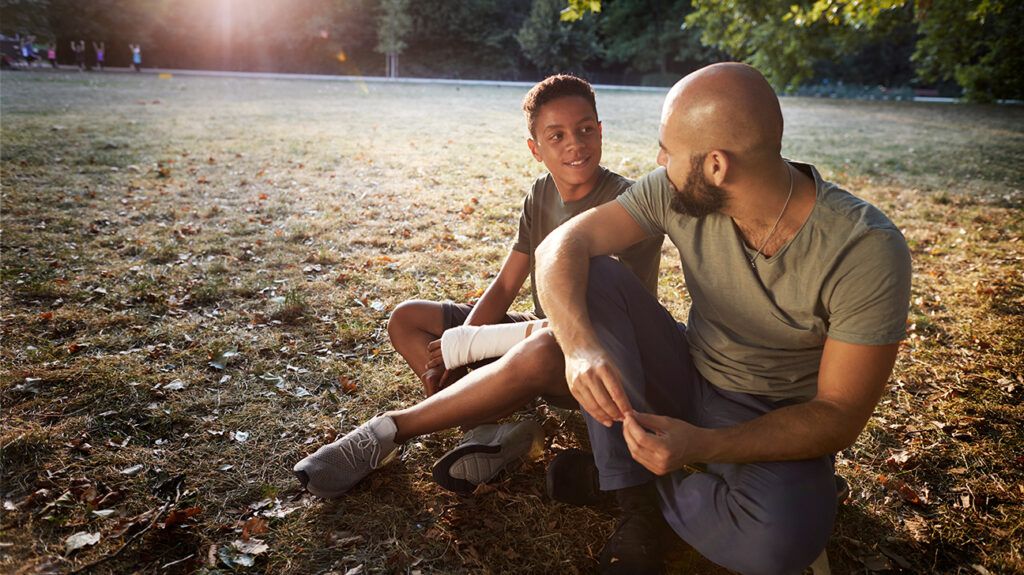You might remember peer pressure when you were a teen, which is why you want to be proactive in talking with your kid about drinking.

Whether you caught your teen drinking or your child is just approaching an age when kids like to party, it’s natural to worry about underage drinking. Drinking is the drug of choice for teens today, and according to the National Institutes of Health (NIH), it’s a serious public health problem in the United States.
In 2019:
- More than
24% of 14- to 15-year-olds said they had at least 1 drink. - 7 million people 12 to 20 years old say they drank more than “just a few sips” in the past month.
- 4.2 million underage kids reported binge drinking — which put them at risk of injury, physical or sexual assault, and death.
If you’re a parent, you might be wondering what the best way is to keep your child safe.
Boundaries are helpful, so it’s OK to set clear rules and expectations for your child when it comes to drinking.
Opt for communicating consequences proactively
The key is to lay out these rules — and the consequences for breaking them — clearly when neither of you are angry. You’ll want to be consistent with your discipline, too. Studies have linked inconsistent discipline and hostility to underage drinking.
Once you’ve laid out your rules, you might want to follow up and keep an eye on your child.
Here are some helpful tips on monitoring your child without being overprotective.
Appropriate punishment for teen drinking
If you catch your teen drinking, try not to lead with anger, shame, or a long lecture.
Instead, be calm, empathetic but firm while you enforce your prediscussed rules.
For example, if your child goes to a friend’s house and drinks, maybe you’ll tell them: You can’t go to your friend’s house until you prove (with actions, not words) you won’t repeat the behavior.
What’s more influential than punishing your older kid?
Establishing a loving, supportive relationship with your child is important, as is keeping the channels of communication open.
This is because they’ll be less susceptible to peer pressure due to higher self-esteem, and because they’ll feel like they can talk to you if they ever have questions about alcohol or drinking.
They’ll also be more likely to want to live up to your expectations, instead of defying them, because they have a
Teens don’t do as we say, they do as we do
Remember too, that it’s important to lead by example. How you behave around alcohol will teach your child a lot more than any rules you lay out.
If you display healthy behaviors toward alcohol, they will, too. Research on early onset alcohol use shows that parents who drink or talk a lot about drinking have kids who are more likely to try alcohol earlier. Those who are warned about dangers are more likely to wait.
- Try to remain calm, honest, and assertive when you talk to your teen about alcohol.
- If you drink, acknowledge that, but also clearly lay out why it’s different for an adult and a teen to drink because of its
effect on their growing brain. - Ask your teen questions and let them truly answer — even if their answer is hard to hear. For example, if you find alcohol in their room, you could ask them where the got it, why they have it, and why they’re interested in drinking.
- Let your child know that they can come to you with any questions, concerns, or just to talk.
- Practice active listening when you child talks.
- Explain your household rules and why alcohol can be dangerous in adolescence. You could touch on legal implications of underage drinking, too.
- Ask your teen open-ended questions about where they’re going, who they’re seeing, or who their friends are.
- If someone in your family has challenges with addiction or drinking, be honest about that. Allow your teen to ask you any questions about this, too.
“Alcoholism just runs in our family.”
Genetics can play a role in developing some mental or physical health conditions, but that’s not the end of the story.
Epigenetics is the study of how the DNA you inherit does or does not manifest in you. This means predispositions that run in your family can stay inactive within you, or can even be reversible when signs show up early.
You can learn more about childhood abuse, complex trauma, and epigenetics here.
There are a few ways to talk about alcohol with your teen, both before it becomes a problem and after you’ve had a discipline issue. Here are some tips:
Do’s
- “I remember you’re going out tonight with the guys, sounds like it’ll be a good time. Remember to steer away from alcohol offers, or sips. If you drink, you lose the privelege to drive your car.”
This reinforces your support of their right to have fun, while clearly repeating the consequences already laid out. It also specifies what they are to avoid. - “You said you want to hang out with her this weekend and sleep over? I bet it’ll be good to get away. What are her interests these days? Where are y’all looking to hang out? Who might meet up with you two? Which of her parents will be home? OK, as soon as I get her dad’s number and confirm, we’ll be good to go.“
This type of communication looks to learn more about the hosting friend to the sleepover. In learning the friend’s latest interests, you’ll be able to also glean what’s not mentioned as well as what is.
This strategy also affirms your acknowledgment your teen might need to self-care away from parents but also ensures a responsible party’s contact information is confirmed before you acquiesce. - “I hear you saying you want to pre-game and after-party around winter formal, but you don’t know where you’ll be? I want you to celebrate but that much unsupervised time away isn’t going to work for me, based on your previous drinking.
Let’s see what’ll work instead: Why don’t you take pictures and dine with your friends, and I’ll arrange for a rideshare to bring you and your date home after the dance? That way, you get to have your time, enjoy the dance and not have to stress about ‘mom picking you up’ or your friends possibly drinking and driving?”
This option validates their wishes, makes clear previous breaches of household drinking rules disqualified the teen from the freedom to stay out late but also provides a realistic alternative (that you can monitor on your app) while staying calm and assertive.
Don’ts
- “I better not catch you drinking!”
All this conveys is they shouldn’t get caught. - “I forbid you to ___”
To you this may sound like an ultimatum, many teens might take it as a dare. - “If any of your friends drink, you better tell me.”
Forcing teens to betray the confidence of their friends will likely put a wedge between you and them.
Consistentstudies find the combination of discipline, rules, and boundaries with warmth and kindness as being the most effective parenting styles. - “I know you’re going to drink so you better just not get drunk.”
Remember what we allow, we teach. One analysis finds teens are more likely to smoke or drink if their parents assume they already uses substances. This response doesn’t provide clarity to your teen on your stance of abstinence versus moderation. - “How much I drink isn’t any of your business.”
One of Ralph Waldo Emerson’s famous passages has paraphrased over the years as: “Your actions speak so loudly, I can not hear what you’re saying!” Caregivers might heed the adage and practice what we preach.
It’s natural to worry about your teen and alcohol. But parents who know what their teen is up to and are clear and consistent with their rules can lessen the chances that their teen will drink. If you have problems, though, it’s not only OK, it’s recommended to seek professional help.
